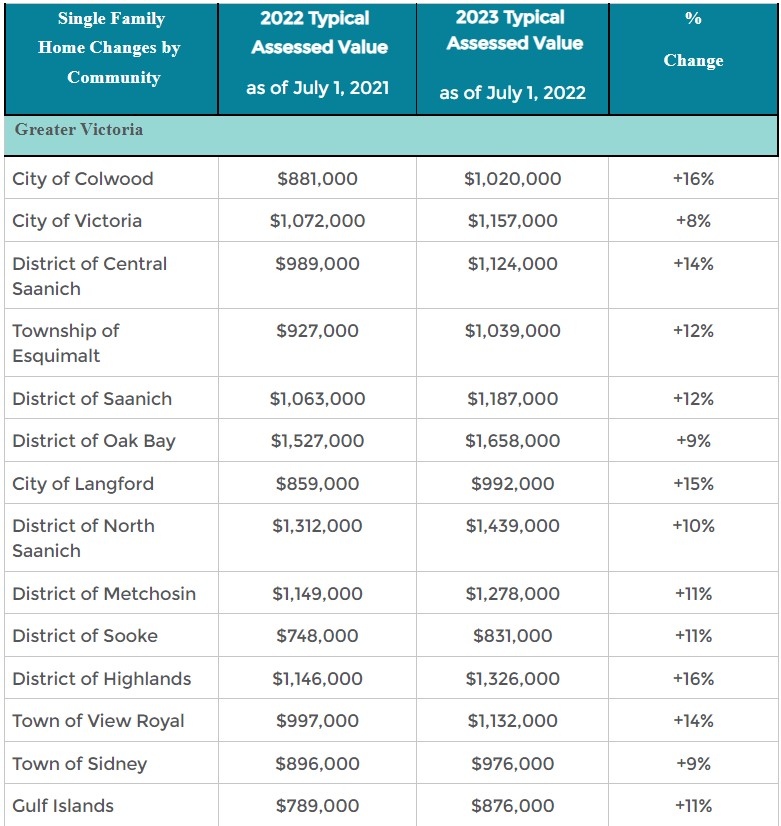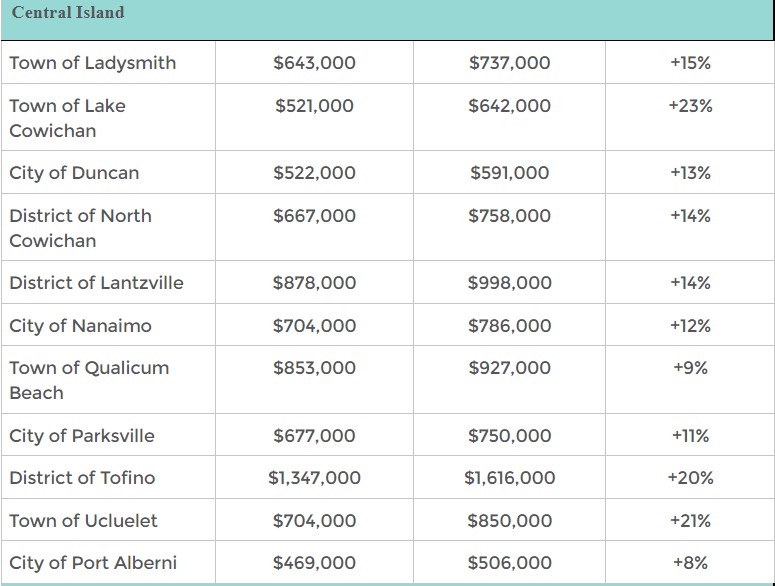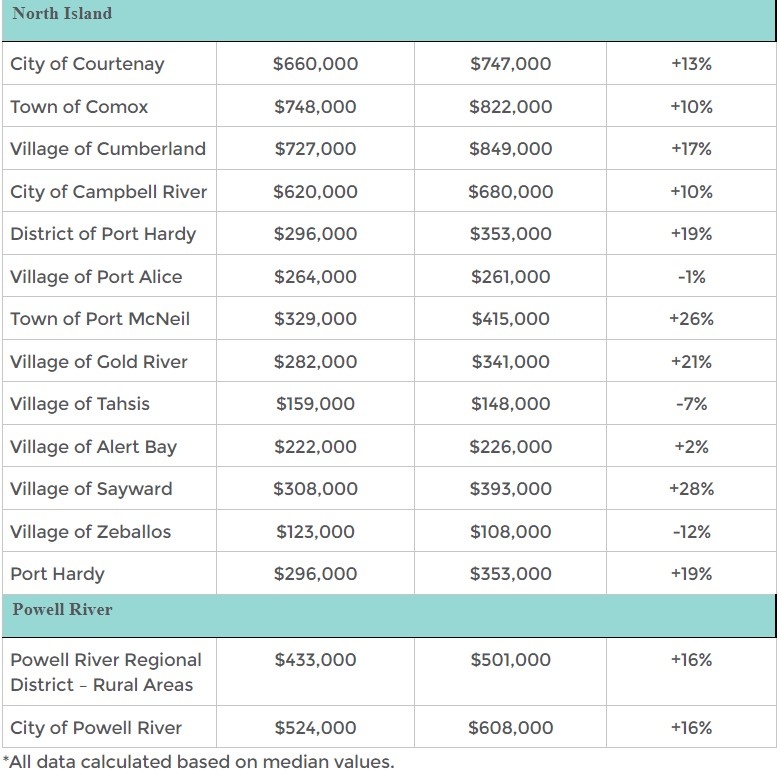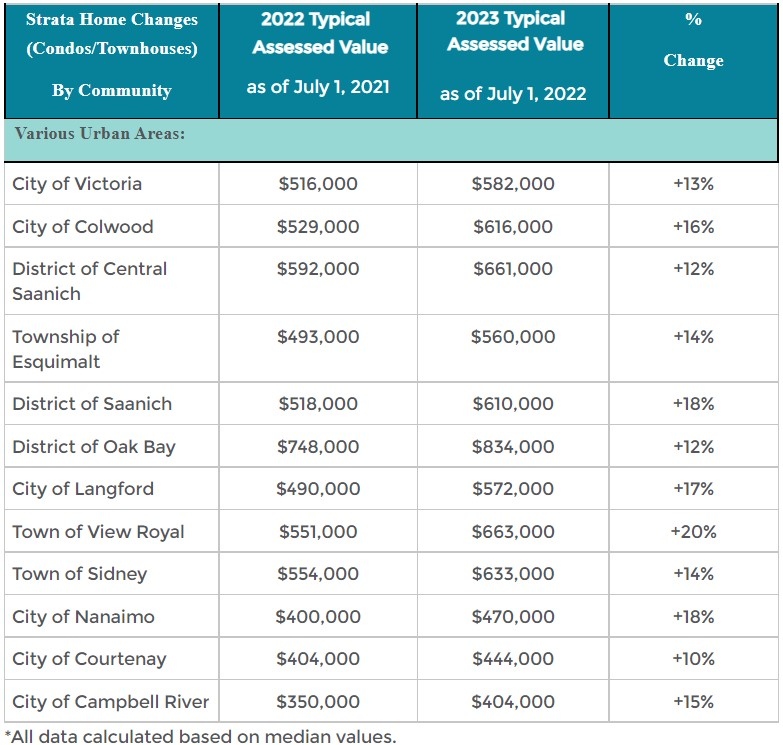Here's how much home assessments rose on Vancouver Island this year
Residents of Vancouver Island should expect their property assessments to rise about 10 to 20 per cent compared to last year, according to BC Assessment.
The organization's official 2023 assessment notices have been sent to about 384,000 property owners in the region and are expected to arrive by mail in the next several days.
The assessments are based on market values as of July 1, 2022, compared to the same date in 2021.
"While the current real estate market has been trending downwards, it is important to consider that 2023 assessments are based on what your home could have sold for as of July 1, 2022, when the market was performing higher," said, Jodie MacLennan, Vancouver Island deputy assessor, in a release Tuesday.
In Greater Victoria, the average assessment values for single-family homes saw the largest increases in Colwood and Highlands.
In Colwood, the typical assessed value of a single-family home rose 16 per cent, from about $881,000 in July 2021 to $1,020,000 in July 2022.
In Highlands, average assessment values also rose 16 per cent, from $1,146,000 to $1,326,000, according to BC Assessments.
In Victoria, the typical assessed value of a single-family home rose a more modest eight per cent, up from $1,072,000 last year to an average of $1,157,000 in this year's assessment.
REGIONAL INCREASES
Elsewhere on Vancouver Island, there were significant increases in the average assessment value of single-family homes in Lake Cowichan, Ucluelet and Tofino.
Lake Cowichan saw typical assessment values rise 23 per cent, up from $521,000 in July 2021 to $642,000.
In Ucluelet, average assessment values rose 21 per cent, from $704,000 to $850,000, while Tofino saw average assessment values increase 20 per cent, from $1,347,000 last year to $1,616,000 for a typical single-family home.
NORTH ISLAND
More extreme swings were seen in northern Vancouver Island, where some communities saw assessment values soar for single-family homes, while other communities saw their values fall.
In Sayward, average assessment values rose 28 per cent, up from $308,000 to $393,000 – while in Port McNeil, average assessment values increased 26 per cent from $329,000 to $415,000.
In Zeballos, average assessment values for single-family homes declined 12 per cent from $123,000 in last year's assessment to $108,000 this year.
In Tahsis, typical assessment values also dropped, down seven per cent from $159,000 to $148,000.
A look at average assessment values for single-family homes on Vancouver Island this year can be found below:
 (BC Assessment)
(BC Assessment)
 (BC Assessment)
(BC Assessment)
 (BC Assessment)
(BC Assessment)
CONDOS
Typical assessment values for condos rose significantly for most communities on Vancouver Island in this year's assessment.
In View Royal, average assessment values for condos rose 20 per cent, from $551,000 in last year's assessment to $663,000 this year, marking the largest proportional increase in the region.
The District of Saanich and City of Nanaimo also saw their average assessed values for condos rise by 18 per cent this year, according to BC Assessment.
In Victoria, average assessed values for condos rose 13 per cent, from $516,000 to $582,000.
 (BC Assessment)"It is important to understand that changes in property assessments do not automatically translate into a corresponding change in property taxes," said MacLennan.
(BC Assessment)"It is important to understand that changes in property assessments do not automatically translate into a corresponding change in property taxes," said MacLennan.
Property taxes generally only change if your property increased or decreased significantly compared to the average change in your neighbourhood.
While assessment notices are expected to arrive by mail over then next several days, residents can also check the BC Assessment website for details about the 2023 assessment.
Anyone with concerns or complaints about their properties is asked to contact BC Assessment as soon as possible, and complaints must be submitted by Jan. 31.
CTVNews.ca Top Stories

W5 Investigates 'I never took part in beheadings': Canadian ISIS sniper has warning about future of terror group
An admitted Canadian ISIS sniper held in one of northeast Syria’s highest-security prisons has issued a stark warning about the potential resurgence of the terror group.
'Absolutely been a success': Responders looks back at 988, Canada's Suicide Crisis Helpline, one year later
In its first year, responders for Canada's Suicide Crisis Helpline, known as 988, have answered more than 300,000 calls and texts in communities nationwide.
Prime Minister Trudeau meets Donald Trump at Mar-a-Lago
Prime Minister Justin Trudeau landed in West Palm Beach, Fla., on Friday evening to meet with U.S.-president elect Donald Trump at Mar-a-Lago, sources confirm to CTV News.
Nova Scotia PC win linked to overall Liberal unpopularity: political scientist
Nova Scotia Premier Tim Houston is celebrating his second consecutive majority mandate after winning the 2024 provincial election with 43 seats, up from 34. According to political science professor Jeff MacLeod, it's not difficult to figure out what has happened to Liberals, not just in Nova Scotia but in other parts of Canada.
'Mayday! Mayday! Mayday!': Details emerge in Boeing 737 incident at Montreal airport
New details suggest that there were communication issues between the pilots of a charter flight and the control tower at Montreal's Mirabel airport when a Boeing 737 made an emergency landing on Wednesday.
Hit man offered $100,000 to kill Montreal crime reporter covering his trial
Political leaders and press freedom groups on Friday were left shell-shocked after Montreal news outlet La Presse revealed that a hit man had offered $100,000 to have one of its crime reporters assassinated.
Questrade lays off undisclosed number of employees
Questrade Financial Group Inc. says it has laid off an undisclosed number of employees to better fit its business strategy.
Cucumbers sold in Ontario, other provinces recalled over possible salmonella contamination
A U.S. company is recalling cucumbers sold in Ontario and other Canadian provinces due to possible salmonella contamination.
Billboard apologizes to Taylor Swift for video snafu
Billboard put together a video of some of Swift's achievements and used a clip from Kanye West's music video for the song 'Famous.'

































